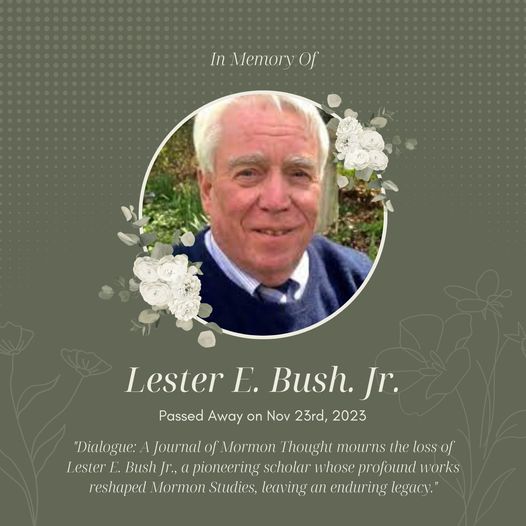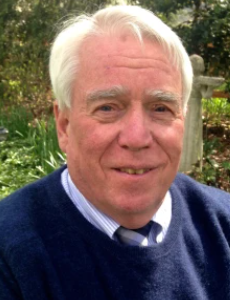Blog
Lester E. Bush Jr. (1942-2023)
November 23, 2023
Pioneering Mormon Studies scholar Lester Bush passed away November 23, 2023. Condolences to his friends and family from all of us at Dialogue. He will be greatly missed.
Please see his author page for a list of his important, impactful scholarly works at Dialogue.

We are pleased to present this lovely reminiscence from Gary Bergera:
Towards the end of my undergraduate years at BYU (1973-74, 1976-80), I researched, wrote, and published two articles that hinted at an emerging interest in history, specifically Mormon history. The first—a study of one man’s attempts circa 1910 to extort money from the LDS Church in exchange for not releasing surreptitiously taken photographs of the interior of the Salt Lake temple—started out as an assignment for a BYU journalism class. The second, and more controversial, article was a discussion of the mostly doctrinal arguments between church leaders Orson Pratt and Brigham Young. I don’t remember the origins of the article; it too may have begun as a class assignment. I remember researching in the LDS Church Archives in the late 1970s and stumbling upon the microfilmed minutes of meetings of the Quorum of Twelve Apostles that concerned the theological showdown between Pratt and Young, documents that had been misfiled in the papers of the early years of the Salt Lake City High Council. Archives personnel approved my request for copies, and maybe a year later or so later the article appeared in 1980 in Dialogue: A Journal of Mormon Thought.
At Dialogue, Lester Bush was the line editor. Following my mission to southern France from 1974 to 1976, I had read Lester’s magisterial analysis of the church’s racist priesthood and temple ban published in 1973 in Dialogue. For me, reading Lester’s article had been a singularly shattering experience. It had never occurred to me before that LDS leaders could be so fundamentally wrong about something so important. In my first city on my mission, Marseilles, I inherited, as the junior companion, an investigator who’d been through all the missionary discussions, decided not to be baptized, but remained very friendly to the missionaries. She was an American woman who’d come to France in the 1960s, borne a boy with a Black jazz musician, then later married a white Frenchman, and borne two more boys. Before I arrived, she’d heard and apparently accepted all the missionary discussions. During her baptismal interview, the missionary, as was the practice at the time, brought up for the first time tithing and the priesthood/temple ban. When she heard the ban, she stopped the interview. She asked the missionary, “How can I tell one of my children that he’s not as worthy as his brothers?” For a long time, I accepted, or at least didn’t argue with, the LDS folk teaching that linked the ban to one or more acts of unworthiness in a pre-mortal state. Lester’s article demolished that shaky rationale and effectively replaced it with simple human prejudice.
Lester didn’t hesitate to reorganize my submission on Pratt and Young. The edited manuscript that survives is, in at least one of its various stages, an example of literal cutting and pasting, though in my case, it’s scissoring and stapling. Lester was ever patient and encouraging. He taught me not to be afraid of editing, that editing, however painful, almost always improves the manuscript, to the benefit of both reader and author. Lester’s example, both as a scholar and an editor, was an important event in shaping my life’s course. I remain forever in Lester’s debt.
For samples of Lester’s work, see the following illustrations. The first is a scan of the first page of a draft of my essay on Pratt and Young. The handwriting, except for the title, is Lester’s. The second is Lester’s handwritten recommendations on the back of one of the pages of the same draft of my essay. The third is the first page of a letter Lester wrote to explain his editing suggestions.


 Back to all blog articles
Back to all blog articles

